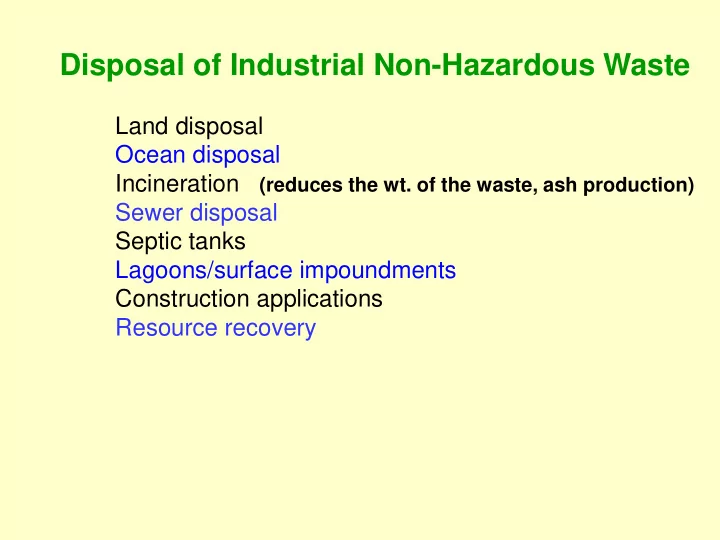

Disposal of Industrial Non-Hazardous Waste Land disposal Ocean disposal Incineration (reduces the wt. of the waste, ash production) Sewer disposal Septic tanks Lagoons/surface impoundments Construction applications Resource recovery
HAZARDOUS WASTE (source USEPA) www.epa.gov ( U.S. Environmental Protection Agency) Major source is Industrial activity Poses significant threat to the environment/health In combination with other materials or alone Four types (EPA, 1980) Type 1 Aqueous-Inorganic Type 2 Aqueous-Organic Type 3 Organic Type 4 Hazardous sludges, slurries & solids
HAZARDOUS WASTE Major source is Industrial activity Poses significant threat to the environment/health In combination with other materials or alone Hazard associated with the waste is not only due to its presence but also due to its concentration Hazardous material in a very dilute form may be harmless, even though in its concentrated form it may be very toxic. As such, detection of a “Hazardous material” in the ground does not necessarily indicate a significant problem
Sources of Hazardous Waste Nuclear Power Plants Municipal Solid Waste (MSW) Landfills Chemical and Primary Metal Industries Paint and Dye Manufacturing Industries Mining Industries Paper and Pulp Industries Battery, Fuel cell industry Leather industry Electroplating Textile industries Hospitals and pharmaceutical companies
Examples Non-biodegradable Synthetic Organics Heavy Metal (Chlorinated Hydrocarbons) Dioxin (A chemical which causes cancer, Lead especially breast cancer, the combination of fat, high heat, and plastics releases dioxin) Mercury DDT Arsenic Kepone Cadmium Mirex Tin PCB's Zinc Carbon Tetrachloride Chromium Benzene Copper Chloroform Beryllium Polyvinyl Chlorides Strontium
Recommend
More recommend